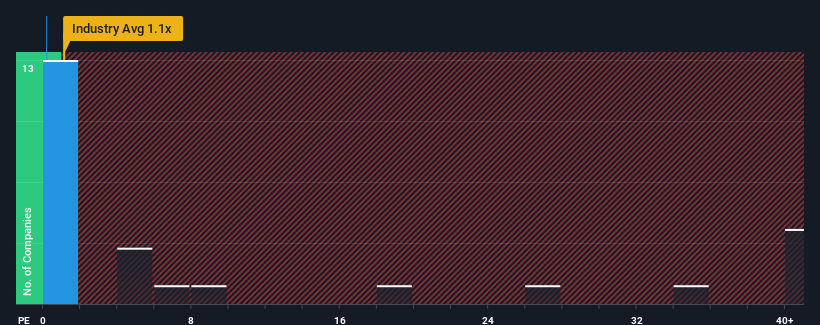- France
- /
- Real Estate
- /
- ENXTPA:NXI
Nexity SA's (EPA:NXI) Price Is Right But Growth Is Lacking After Shares Rocket 31%
Those holding Nexity SA (EPA:NXI) shares would be relieved that the share price has rebounded 31% in the last thirty days, but it needs to keep going to repair the recent damage it has caused to investor portfolios. Unfortunately, the gains of the last month did little to right the losses of the last year with the stock still down 49% over that time.
Even after such a large jump in price, Nexity may still be sending buy signals at present with its price-to-sales (or "P/S") ratio of 0.2x, considering almost half of all companies in the Real Estate industry in France have P/S ratios greater than 1.1x and even P/S higher than 18x aren't out of the ordinary. Although, it's not wise to just take the P/S at face value as there may be an explanation why it's limited.
Check out our latest analysis for Nexity

What Does Nexity's Recent Performance Look Like?
Nexity has been struggling lately as its revenue has declined faster than most other companies. The P/S ratio is probably low because investors think this poor revenue performance isn't going to improve at all. You'd much rather the company improve its revenue performance if you still believe in the business. Or at the very least, you'd be hoping the revenue slide doesn't get any worse if your plan is to pick up some stock while it's out of favour.
If you'd like to see what analysts are forecasting going forward, you should check out our free report on Nexity.Is There Any Revenue Growth Forecasted For Nexity?
In order to justify its P/S ratio, Nexity would need to produce sluggish growth that's trailing the industry.
Retrospectively, the last year delivered a frustrating 8.9% decrease to the company's top line. As a result, revenue from three years ago have also fallen 12% overall. Accordingly, shareholders would have felt downbeat about the medium-term rates of revenue growth.
Turning to the outlook, the next three years should bring diminished returns, with revenue decreasing 0.2% each year as estimated by the five analysts watching the company. With the industry predicted to deliver 3.9% growth each year, that's a disappointing outcome.
In light of this, it's understandable that Nexity's P/S would sit below the majority of other companies. However, shrinking revenues are unlikely to lead to a stable P/S over the longer term. There's potential for the P/S to fall to even lower levels if the company doesn't improve its top-line growth.
The Final Word
Nexity's stock price has surged recently, but its but its P/S still remains modest. It's argued the price-to-sales ratio is an inferior measure of value within certain industries, but it can be a powerful business sentiment indicator.
It's clear to see that Nexity maintains its low P/S on the weakness of its forecast for sliding revenue, as expected. Right now shareholders are accepting the low P/S as they concede future revenue probably won't provide any pleasant surprises. It's hard to see the share price rising strongly in the near future under these circumstances.
Plus, you should also learn about these 4 warning signs we've spotted with Nexity (including 1 which can't be ignored).
If companies with solid past earnings growth is up your alley, you may wish to see this free collection of other companies with strong earnings growth and low P/E ratios.
Valuation is complex, but we're here to simplify it.
Discover if Nexity might be undervalued or overvalued with our detailed analysis, featuring fair value estimates, potential risks, dividends, insider trades, and its financial condition.
Access Free AnalysisHave feedback on this article? Concerned about the content? Get in touch with us directly. Alternatively, email editorial-team (at) simplywallst.com.
This article by Simply Wall St is general in nature. We provide commentary based on historical data and analyst forecasts only using an unbiased methodology and our articles are not intended to be financial advice. It does not constitute a recommendation to buy or sell any stock, and does not take account of your objectives, or your financial situation. We aim to bring you long-term focused analysis driven by fundamental data. Note that our analysis may not factor in the latest price-sensitive company announcements or qualitative material. Simply Wall St has no position in any stocks mentioned.
About ENXTPA:NXI
Excellent balance sheet and good value.
Similar Companies
Market Insights
Community Narratives



